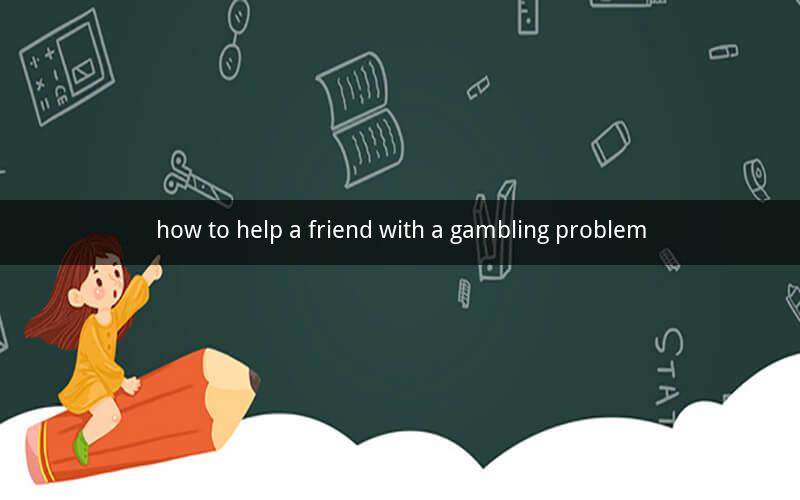
Table of Contents
1. Understanding the Problem
2. Open Communication
3. Encourage Professional Help
4. Support Group Participation
5. Financial Support
6. Monitoring Progress
7. Setting Boundaries
8. Educating Yourself
9. Encouraging Positive Habits
10. Patience and Understanding
1. Understanding the Problem
The first step in helping a friend with a gambling problem is to understand the nature of the issue. Gambling addiction is a complex disorder characterized by an inability to control the urge to gamble, despite negative consequences. It is essential to recognize the signs of a gambling problem, such as secretive behavior, financial strain, and neglect of personal responsibilities.
2. Open Communication
Communication is key in addressing a friend's gambling problem. Initiate a conversation in a non-confrontational manner, focusing on your concern for your friend's well-being rather than accusing them of wrongdoing. Be prepared to listen actively and without judgment, allowing your friend to express their feelings and thoughts.
3. Encourage Professional Help
Gambling addiction is a serious condition that often requires professional intervention. Encourage your friend to seek help from a therapist, counselor, or support group specializing in gambling addiction. These professionals can provide personalized treatment plans and coping strategies to overcome the addiction.
4. Support Group Participation
Support groups can be a valuable resource for both the individual struggling with gambling addiction and their loved ones. Encourage your friend to attend meetings and connect with others who share similar experiences. Support groups can offer emotional support, practical advice, and a sense of community.
5. Financial Support
Financial strain is a common consequence of gambling addiction. Consider offering financial support to help your friend manage their debts and stabilize their financial situation. However, it is crucial to set boundaries and ensure that your support does not enable their addiction.
6. Monitoring Progress
Keep an eye on your friend's progress and offer encouragement along the way. Celebrate small victories and remind them of the importance of maintaining their sobriety. Be prepared to offer additional support if their progress stalls or if they relapse.
7. Setting Boundaries
Establish clear boundaries to protect yourself from the negative consequences of your friend's addiction. This may include limiting your interaction with them, setting financial boundaries, or avoiding situations that may trigger their gambling behavior.
8. Educating Yourself
Educate yourself about gambling addiction to better understand the challenges your friend faces. This knowledge can help you offer more informed support and empathize with their struggles.
9. Encouraging Positive Habits
Encourage your friend to develop healthy habits that can help them overcome their addiction. This may include exercise, hobbies, and social activities that provide a sense of fulfillment and distract them from the urge to gamble.
10. Patience and Understanding
Recovery from a gambling addiction is a long and challenging process. Be patient and understanding as your friend navigates the ups and downs of their journey. Offer unconditional love and support, recognizing that recovery is a gradual process.
Questions and Answers
1. Q: How can I approach my friend about their gambling problem without causing a confrontation?
A: Choose a private, quiet setting and express your concern for their well-being. Focus on your feelings rather than accusing them of wrongdoing.
2. Q: What if my friend refuses to seek professional help?
A: Continue to offer support and resources, but be prepared to set boundaries if their addiction continues to harm them or others.
3. Q: How can I help my friend manage their financial debts?
A: Encourage them to seek financial counseling and offer to help them create a budget and prioritize their debts.
4. Q: Should I limit my interaction with my friend if they have a gambling problem?
A: Consider setting boundaries to protect yourself from the negative consequences of their addiction. However, maintaining a supportive relationship is crucial for their recovery.
5. Q: What can I do if my friend relapses?
A: Remind them of their progress and encourage them to seek additional support. Avoid becoming discouraged and continue to offer your love and support.
6. Q: How can I support my friend in developing healthy habits?
A: Suggest activities they enjoy and offer to join them. Celebrate their successes and encourage them to continue pursuing their interests.
7. Q: Should I confront my friend's gambling habits in front of others?
A: It is best to address the issue privately to protect your friend's dignity and avoid embarrassment.
8. Q: How can I educate myself about gambling addiction?
A: Read books, attend workshops, and seek out reputable online resources to learn more about the disorder and its treatment options.
9. Q: Can I help my friend by taking over their financial responsibilities?
A: While you can offer financial support, it is important to set boundaries to prevent enabling their addiction. Encourage them to take responsibility for their debts.
10. Q: How can I maintain my patience and understanding throughout the recovery process?
A: Remind yourself that recovery is a long and challenging journey. Seek support from others who have experienced similar situations and focus on your friend's progress, rather than setbacks.